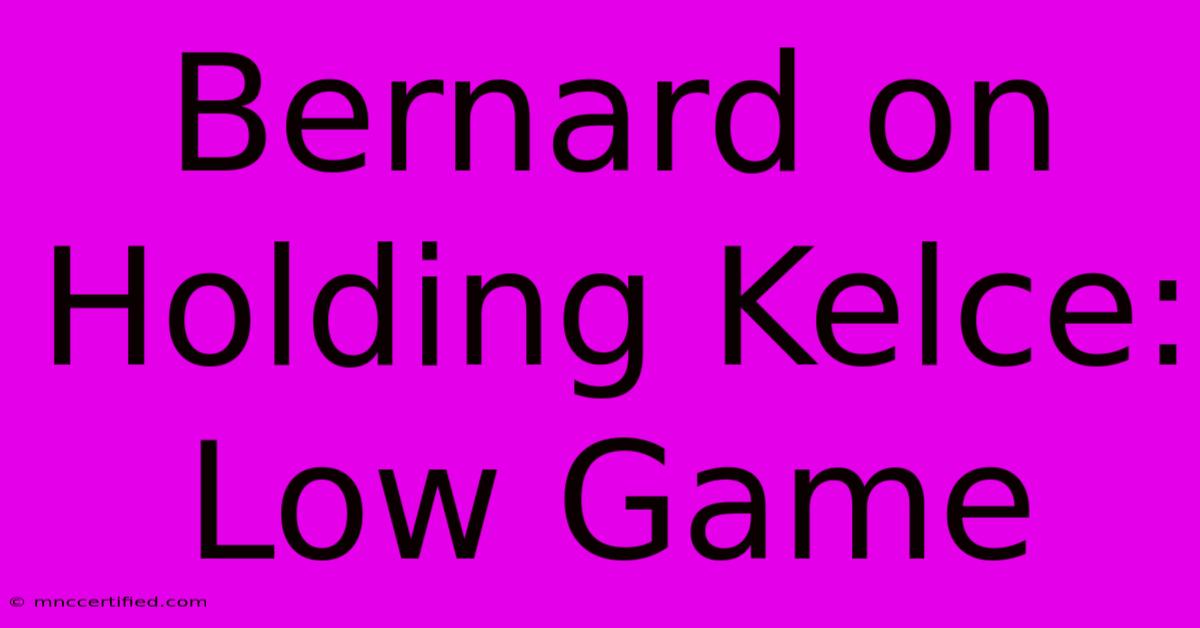Bernard On Holding Kelce: Low Game

Table of Contents
Bernard on Holding Kelce: Low Game – Was it a Fair Call?
The controversial holding call against Eagles cornerback James Bradberry in the final two minutes of Super Bowl LVII continues to spark debate. Many believe the penalty, which significantly impacted the game's outcome, was a questionable call, particularly given the context of the game and the officiating. This article delves into the incident, exploring the perspectives of both sides and examining whether the call was truly a "low game" as some have suggested.
The Play in Question: Context is Key
The play itself saw Chiefs tight end Travis Kelce running a crucial route. Bradberry, tasked with covering Kelce, made contact with him, undoubtedly influencing Kelce's ability to make a play on the ball. The referee threw a flag, penalizing Bradberry for holding. This penalty gave the Chiefs a first down, essentially sealing the game's outcome and allowing them to run out the clock.
Was it holding? Yes, by the letter of the law, contact was made, and the referee deemed it significant enough to warrant a penalty. However, many argue the contact was minimal, a natural byproduct of tight coverage in a high-stakes situation. This is where the controversy lies. The "low game" accusation stems from the perception that the penalty was called too liberally, and possibly at a pivotal moment that unfairly decided the game.
The Argument for a Questionable Call
The argument against the call centers on several points:
-
Consistency of Officiating: Many viewers and analysts point to a lack of consistency in officiating throughout the game and the playoffs. Calls that seemed similar were not always flagged, leading to accusations of bias or inconsistency in the application of the rules. This lack of consistency fuels the perception that the holding call was unfairly enforced.
-
Game Context: The call was made in the final crucial minutes, with the game hanging in the balance. The perceived impact of the call, essentially deciding the game, further intensifies criticism. Some suggest that less significant contact in earlier plays was not flagged, highlighting the perceived lack of consistency.
-
The "Unsportsmanlike" Nature of the Call: Several commentators have argued that calling such a marginal penalty at such a critical point felt unsporting. They suggest that letting the play continue and allowing for a more decisive result on the field would have been a fairer outcome. This is where the “low game” label takes hold, implying a lack of sportsmanship or fair play from the officiating crew.
The Argument for a Correct Call
Conversely, some defend the call, arguing that:
-
The Rule is the Rule: Regardless of the context or the game's stage, holding is a penalty. The referee made a judgment call, and while it may have been a tight call, it wasn't outside the realm of possibility. The argument that the officiating was inconsistent doesn't negate the fact that holding did occur.
-
Consistency is Difficult to Achieve: Consistency in officiating is notoriously challenging. Referees are human, and even with rigorous training, making consistent calls across numerous plays and games is inherently difficult. Human error is inevitable.
-
The Call Was Based on Observation: The referee, in his position, saw the contact and determined it was holding. While television replays can offer a different perspective, the referee’s in-game assessment remains paramount.
Conclusion: The Ongoing Debate
The "Bernard on Holding Kelce: Low Game" debate highlights the inherent complexities of officiating in high-stakes sporting events. While the call was technically correct by the rulebook, the timing and perceived lack of consistent officiating throughout the game continue to fuel controversy. Ultimately, whether one views the call as "low game" or simply a controversial decision hinges on individual perspectives and interpretations of the rules, context, and the role of officiating in deciding the outcome of a major sporting event. The conversation continues, and likely will, for quite some time.

Thank you for visiting our website wich cover about Bernard On Holding Kelce: Low Game. We hope the information provided has been useful to you. Feel free to contact us if you have any questions or need further assistance. See you next time and dont miss to bookmark.
Featured Posts
-
Organic Carrot Contamination Fatality Reported
Nov 19, 2024
-
Best Buffalo Bills Gifts This Season
Nov 19, 2024
-
Jinping Backs Starmers Economics
Nov 19, 2024
-
November 24th Seahawks Food Drive
Nov 19, 2024
-
Live Stream Poland Vs Scotland Uk
Nov 19, 2024